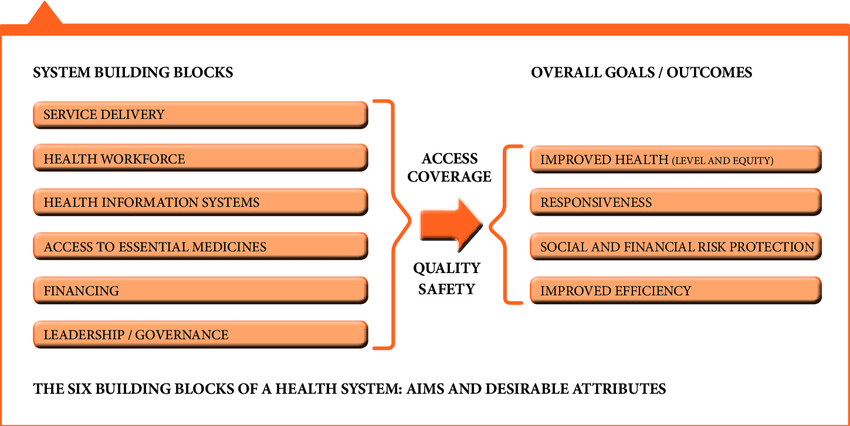Health systems
الخطوط العريضة للقسم
-
Note: if you want to gain a certificate for completing this course, you will have to create an account and log in as a student.
Let's start with some definitions:
"Set within the political and institutional framework of a country, a health system is “the ensemble of all public and private organizations, institutions, and resources mandated to improve, maintain or restore health."” From Health systems strengthening, universal health coverage, health security and resilience
"A health system comprises all organizations, institutions and resources whose primary intent is to improve health. In most countries, the health system is recognized to include public, private and informal sectors. While the World Health Organization (WHO) emphasizes economic, fiscal and political management systems that underpin formally organized health services, it also recognizes the informal sector; this consists of self-help and care by families and communities, and the role of informal and traditional practitioners. Health systems are about more than patient care: they attend to why people become ill in the first place, and foster health-promoting environments, and sound preventive practices." From Primary Health Care and Public Health: Foundations of Universal Health Systems
The need to understand, and to improve, health systems is well encapsulated by this quote from US President Obama who stated: “We will not be successful in our efforts to end deaths from AIDS, malaria and tuberculosis unless we do more to improve the health systems around the world” (5 May 2009).
The aim of this course is to explore health systems, focusing on those in low- to middle-income countries. The course would be suitable for any health professional either working in or interested in health systems in developing countries.
By the end of the course, you should be able to:
-
Understand the attributes of health systems, the role of leadership and governance, and the potential of Health Systems Strengthening
-
Understand the role of various forms of health financing and health insurance, with relevance for Developing Countries
-
Identify what is needed for quality improvement in patient care and health care systems, and the importance of health information to measure process and outcome
-
Explain the importance of the availability of essential drugs, procedures, vaccines and technology (using vaccines as a case study)
-
Understand the importance of an adequate, well trained, and well performing health workforce
The World Health Organisation has attempted to identify 6 building blocks for health systems, and this course covers each of these blocks:

From: World Health Organization (WHO). Everybody's business - strengthening health systems to improve health outcomes: WHO's framework for action. WHO; Geneva: 2007. http://www.who.int/healthsystems/strategy/everybodys_business.pdf
The World Bank is also a key player in health systems: "In the era of sustainable development goals, the World Bank plays a pivotal role in promoting universal health coverage and strengthening health systems." From Universal health coverage, health systems strengthening, and the World Bank
Navigating the course.
We have provided summaries of, and links to, a number of resources we think you will find interesting - to access them, click on the Resources in each section, and then on the hyperlinks within each set of resources. There is also a forum in each section for Reflection - you can post your reflections there if you wish, and see if others have also posted their reflections. There is a quiz at the end to test your knowledge. You can gain a certificate if you download the resources and post to the forum in each section and pass the quiz.

This work is licensed under a Creative Commons Attribution 4.0 International License. -
-
The resources in this section are designed to help understand the importance of health systems to the health of populations and the role of leadership and governance, and the potential of Health Systems Strengthening
-
Reflect on the health system in your setting (national, regional or local) - can you identify a particular area of weakness and how system support or strengthening might help.
-
This section of the course is designed to help you understand the role of various forms of health financing and health insurance, with relevance for Developing Countries
-
Reflect on the feasibility and the potential for Universal Health Coverage in your setting.
-
This section of the course is designed to help identify what is needed for quality improvement in patient care and health care systems, and the importance of health information to measure process and outcome. Both the quality of care and useful information systems are important attributes of good health systems.
-
Reflect on one of the 6 dimensions of quality healthcare identified in the resources section, and consider for your setting how this might be improved and the potential role of information in that improvement
-
This section of the course allows us to consider the importance of the availability of essential drugs, procedures, vaccines and technology (using vaccines as a case study)
-
Reflect on an a topic in the area of availability of essential drugs, procedures, vaccines and technology, other than vaccines, and identify, for your setting, some strategic approaches to supporting or strengthening your health system
-
This section of the course is designed to help understand the importance of an adequate, well trained, and well performing health workforce
-
Reflect on the key workforce issues in your setting, and to what extent, and in what ways, education might improve workforce skills and retention.
-
If you have downloaded the resources in each section, and passed the quiz, you can gain a certificate
-
